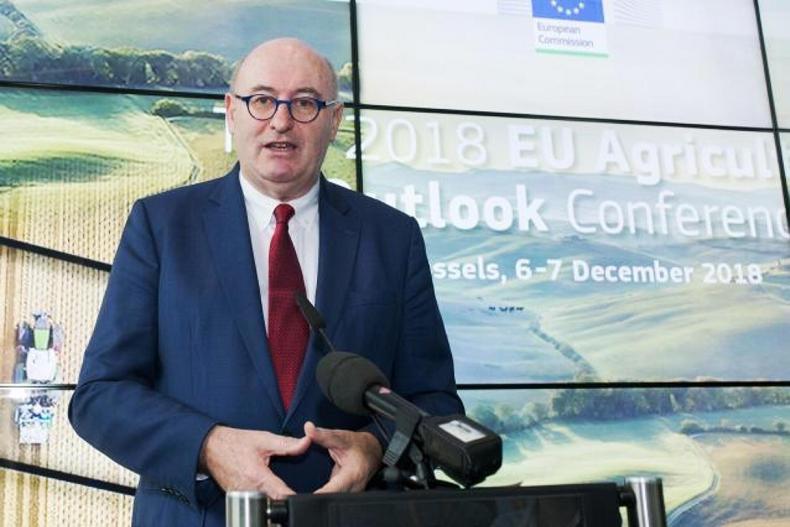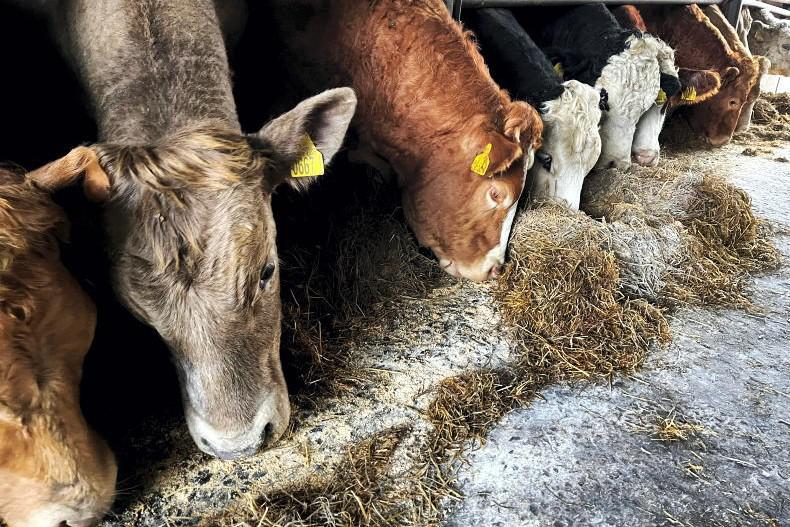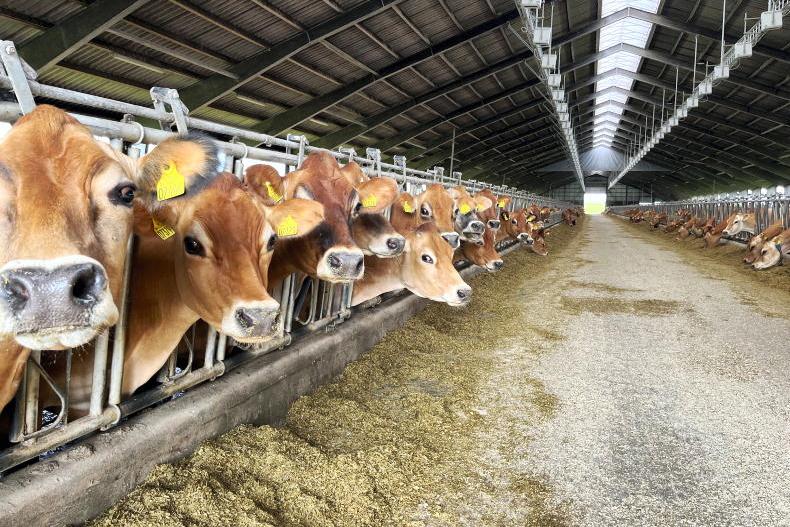The definition of a genuine farmer in the next Common Agricultural Policy (CAP) was a key issue raised by farmers at a regional IFA CAP meeting in Athy on Wednesday night.
Chaired by IFA south Leinster regional chair Tom Short, the meeting heard farmers' opinions on the definition of a genuine farmer, their views on convergence and how the environment will play a big role in the next CAP.
On the definition of a genuine farmer, Kilkenny IFA chair James Murphy said: “I get a sense that there’s almost a reluctance to have a serious look at this and to really challenge ourselves to come up with a wording around the genuine farmer.
“Talking to Liam McHale [the IFA Brussels representative] recently, it’s one of the very few areas of common ground right across the member states of Europe and a great sense of frustration for what we consider to be the active farmer - the farmer that farms actively and in a meaningful way every day, every month, every year.
“This retired farmer, this couch farmer, whatever you want to call him … we have to ask ourselves can this farmer genuinely expect that they then have a right to access CAP money?”
I have a real issue with the idea that a farmer can be active by going out with a large topper once a year
Murphy also said that farmers have to ask themselves what message is that sending to the taxpayers of Europe when increasingly they’re looking to pull that money from farmers and to cut the CAP budget.
“If we want to protect the CAP budget going forward, we’ve got to be credible and I believe that the money has got to go to the farmer that’s taking the risk, to the farmer that’s calving the cow, lambing the ewe, planting the crop, milking the cow – but he’s got to be active. I have a real issue with the idea that a farmer can be active by going out with a large topper once a year and maintaining land in good agricultural and environmental condition,” he said.

Murphy called for bravery and leadership from the IFA on the next CAP. “It will be divisive, but there is a possibility that up to 30% of the farmers right across Europe now fall into this semi-retired couch farmer category. It’s one I would have to encourage [the IFA] to continue to look for a clear definition on because Commissioner [for Agriculture] Phil Hogan has made it clear that there is an opportunity around the way we define a genuine farmer to resolve this issue and it’s an issue too that’s common across every member state,” he said.
Armchair farmers
Liam Delaney chair of Portlaoise IFA branch said that it is unfair to be taking money off the active farmer.
“It’s not fair if a person over 80 years of age getting a single farm payment, if he’s an armchair farmer or if he’s in a nursing home.
“IFA has to stand up for the active farmers. If a farm is being leased for more than 10 years, that fella isn’t farming that owns the land. He’s still going to get the rent tax-free, that should be enough for him.
“There’s too many people not actively farming. People have land and on paper they’re actively farming, but they’re not because [they have someone else renting the farm] the other boy [the person renting] is getting the single farm payment,” he said.
Environment
The CAP proposals outlined earlier this year by Commissioner Hogan had a much larger focus on sustainability and the environment. The demands that will be placed on farmers in the next CAP was another key issue at the CAP meeting in Athy on Wednesday night.
Brian Rushe, Kildare IFA chair, said there are a lot of issues in the CAP debate that are black or white, some of them are even grey.
“One thing that’s very clear to me from day one, from listening to the commissioner and Europe, this CAP will take a more environmental look. In terms of what tillage farmers were asked to do in terms of greening, livestock and other sectors are going to be asked to do more in order to fulfil the criteria.
“The IFA’s position on it is that Irish farmers compared to our European peers are stepping up to the mark on the environmental question every day. We have hedgerows, permanent pasture, hill farmers all sequestering carbon and we’re not getting credit enough for it and we need to get credit for it.
“So it’s vitally important in this reform that any introduction of environmental measures doesn’t erode the payment. Our position is that we’re already doing enough. Give us recognition for what we’re doing first before you start asking to do any more,” he said.
For more coverage on the first IFA CAP meeting and on the second one on Thursday night in Cootehill, see next week’s Irish Farmers Journal.
Read more
22% of proposed CAP 2020 budget for rural development fund
CAP reform may be finalised by October 2019 – Hogan
EU budget and CAP schedule slips away
The definition of a genuine farmer in the next Common Agricultural Policy (CAP) was a key issue raised by farmers at a regional IFA CAP meeting in Athy on Wednesday night.
Chaired by IFA south Leinster regional chair Tom Short, the meeting heard farmers' opinions on the definition of a genuine farmer, their views on convergence and how the environment will play a big role in the next CAP.
On the definition of a genuine farmer, Kilkenny IFA chair James Murphy said: “I get a sense that there’s almost a reluctance to have a serious look at this and to really challenge ourselves to come up with a wording around the genuine farmer.
“Talking to Liam McHale [the IFA Brussels representative] recently, it’s one of the very few areas of common ground right across the member states of Europe and a great sense of frustration for what we consider to be the active farmer - the farmer that farms actively and in a meaningful way every day, every month, every year.
“This retired farmer, this couch farmer, whatever you want to call him … we have to ask ourselves can this farmer genuinely expect that they then have a right to access CAP money?”
I have a real issue with the idea that a farmer can be active by going out with a large topper once a year
Murphy also said that farmers have to ask themselves what message is that sending to the taxpayers of Europe when increasingly they’re looking to pull that money from farmers and to cut the CAP budget.
“If we want to protect the CAP budget going forward, we’ve got to be credible and I believe that the money has got to go to the farmer that’s taking the risk, to the farmer that’s calving the cow, lambing the ewe, planting the crop, milking the cow – but he’s got to be active. I have a real issue with the idea that a farmer can be active by going out with a large topper once a year and maintaining land in good agricultural and environmental condition,” he said.

Murphy called for bravery and leadership from the IFA on the next CAP. “It will be divisive, but there is a possibility that up to 30% of the farmers right across Europe now fall into this semi-retired couch farmer category. It’s one I would have to encourage [the IFA] to continue to look for a clear definition on because Commissioner [for Agriculture] Phil Hogan has made it clear that there is an opportunity around the way we define a genuine farmer to resolve this issue and it’s an issue too that’s common across every member state,” he said.
Armchair farmers
Liam Delaney chair of Portlaoise IFA branch said that it is unfair to be taking money off the active farmer.
“It’s not fair if a person over 80 years of age getting a single farm payment, if he’s an armchair farmer or if he’s in a nursing home.
“IFA has to stand up for the active farmers. If a farm is being leased for more than 10 years, that fella isn’t farming that owns the land. He’s still going to get the rent tax-free, that should be enough for him.
“There’s too many people not actively farming. People have land and on paper they’re actively farming, but they’re not because [they have someone else renting the farm] the other boy [the person renting] is getting the single farm payment,” he said.
Environment
The CAP proposals outlined earlier this year by Commissioner Hogan had a much larger focus on sustainability and the environment. The demands that will be placed on farmers in the next CAP was another key issue at the CAP meeting in Athy on Wednesday night.
Brian Rushe, Kildare IFA chair, said there are a lot of issues in the CAP debate that are black or white, some of them are even grey.
“One thing that’s very clear to me from day one, from listening to the commissioner and Europe, this CAP will take a more environmental look. In terms of what tillage farmers were asked to do in terms of greening, livestock and other sectors are going to be asked to do more in order to fulfil the criteria.
“The IFA’s position on it is that Irish farmers compared to our European peers are stepping up to the mark on the environmental question every day. We have hedgerows, permanent pasture, hill farmers all sequestering carbon and we’re not getting credit enough for it and we need to get credit for it.
“So it’s vitally important in this reform that any introduction of environmental measures doesn’t erode the payment. Our position is that we’re already doing enough. Give us recognition for what we’re doing first before you start asking to do any more,” he said.
For more coverage on the first IFA CAP meeting and on the second one on Thursday night in Cootehill, see next week’s Irish Farmers Journal.
Read more
22% of proposed CAP 2020 budget for rural development fund
CAP reform may be finalised by October 2019 – Hogan
EU budget and CAP schedule slips away











SHARING OPTIONS